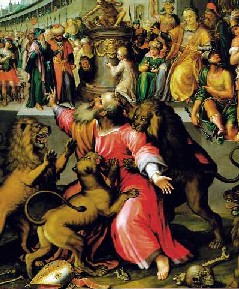 |
| Martyrdom of St. Ignatius of Antioch |
While writing only about a decade after Clement, Ignatius' views on a number of issues are clearly diverging from what is found in the New Testament.
One area of difference is communion, or the eucharist. Ignatius considers the bread to be the flesh of Jesus Christ, rather than just a symbol of Jesus' body. It seems this position came out of his desire to correct a growing heresy that Jesus had not really risen from the dead with a physical body. Regarding heretics, he says:
"They abstain from the Eucharist and from prayer, because they confess not the Eucharist to be the flesh of our Saviour Jesus Christ." Letter to the Smyrnaeans ch. 7
Another first we see in Ignatius' writings is the term "Catholic Church." Catholic in Greek simply means whole, complete, or universal. It was a generic term at the time and it seems that Ignatius intended to distinguish the majority of the churches (catholic) from the few that were following clearly heretical teaching.
The most significant change from the New Testament model is found in Ignatius' description of church leadership. Unlike Clement, Ignatius treats bishops (i.e. overseers) and elders as separate roles in the church, with a lone bishop being in authority over the elders. He equates the bishop with God the Father, and the elders with the Apostles, and teaches absolute obedience to the bishop as one would give to God. In terms of church life, the bishop was the only one permitted to authorize baptisms and perform the Eucharist. In his letter to Polycarp, he even says that people who marry should do so with the approval of the bishop. Note that in the quotes below that "presbytery" is synonymous with "elders."
"I salute your most worthy bishop, and your very venerable presbytery, and your deacons, my fellow-servants, and all of you individually." Letter to the Smyrnaeans, ch. 12.
"See that ye all follow the bishop, even as Jesus Christ does the Father, and the presbytery as ye would the apostles; and reverence the deacons, as being the institution of God. Let no man do anything connected with the Church without the Bishop. Let that be deemed a proper Eucharist, which is [administered] either by the bishop, or by one to whom he has entrusted it. Wherever the bishop shall appear, there let the multitude [of the people] also be; even as, wherever Jesus Christ is, there is the Catholic Church. It is not lawful without the bishop either to baptize or to celebrate a love-feast; but whatsoever he shall approve of, that is also pleasing to God, so that everything that is done may be secure and valid." Letter to the Smyrnaeans, ch. 8.
"... your bishop presides in the place of God, and your presbyters in the place of the assembly of the apostles, along with your deacons." Letter to the Magnesians, ch. 6.
"It is well to reverence both God and the bishop. He who honours the bishop has been honoured by God; he who does anything without the knowledge of the bishop, does serve the devil." Letter to the Smyrnaeans, ch. 9.
It is not entirely clear how this new office of bishop was instituted, but it clearly was not just an anomaly in Antioch. In his letter to the Ephesians, he states that bishops "settled everywhere to the utmost bounds" of the earth. He also specifically mentions the bishop of Smyrna (Polycarp) and the bishop of Ephesus (Onesimus). Clearly this practice of having a single bishop over the elders of a church had become widespread in a very short period of time after Clement.
Despite his pleas to the churches to obey their bishop, Ignatius is not simply power hungry. He comes across as a gracious, Godly man in his tone and words.
"I do not issue orders to you, as if I were some great person. For though I am bound for the name [of Christ], I am not yet perfect in Jesus Christ." Letter to the Ephesians, ch. 3.
Ignatius' writings show how the early church was quickly adopting a new organizational structure to deal with the heresies that were creeping into the churches. It seems to have been an intentional change, borne out of good motives to solve a very real and serious problem. However, the consequences would turn out to be severely detrimental in the years that followed.
Error in The Pilgrim Church Book
Broadbent attributes a misuse of Acts 20:17 to Ignatius.
"Commenting on Acts 20, he says that Paul sent from Miletus to Ephesus and called the bishops and presbyters, thus making two titles out of one description, and says that they were from Ephesus and neighboring cities, thus obscuring the fact that one church, Ephesus, had several overseers or bishops." p. 32
After reviewing all of Ignatius' writings, I could find no such reference to Acts 20. I tracked down Broadbent's source, a book by Henry Alford entitled The Greek Testament Critical Exegetical Commentary. In Vol. 2, p. 227, Alford does describe this exact misuse of Acts 20, but attributes it to Irenaeus rather than Ignatius. Problem solved!
No comments:
Post a Comment